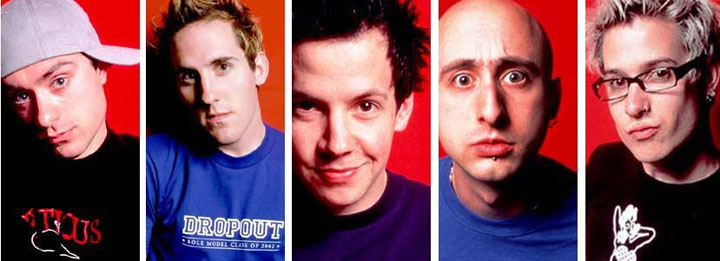 |
|
The punk-pop combo known as Simple Plan are unquestionably one of the most exciting young bands of the day. The
Montreal-based punk quintet has spent the past two years knocking out crowds with storming gigs alongside such bands as Sum
41 and blink-182.
The Simple Plan story begins in the mid-1990s, when drummer Chuck Comeau and singer
Pierre Bouvier were 13-year-old bandmates in Reset, a loud and fast punk outfit who toured Canada with such
likeminded artists as MXPX, Ten Foot Pole and Face To Face.
"Pierre and me have been friends forever,"
Chuck says. "We've been playing together since the day I got my first drum kit."
Reset released a much-praised debut
album in 1997, but the following year Chuck opted out of the band to focus on his studies. Unsurprisingly, the drummer was
soon drawn back to music, and in 1999, he started playing with his longtime high school friend, guitarist Jeff Stinco.
Sebastien Lefebvre, another guitar-playing high school pal, was soon added into the mix and a new band was born. The
only thing missing was a singer and a bass player.
"We went on a manhunt," the drummer recalls. "We met tons of people,
but the more we thought about it, the more we realized that we needed to have Pierre in the band." Meanwhile, Bouvier had
become disillusioned with Reset, where he was handling four-string duties along with vocals. "I wanted to call it quits and
go back to school and forget about the whole music thing," Pierre says. "Then one night I saw Chuck at a Sugar Ray
concert in Montreal, and he was like, 'I've got this other band, and we're looking for a singer.' I went over and watched
them practice, and the music was really fresh and really new, so I thought, you know, I'll just give it one more shot."
Taking
Simple Plan as their moniker, the newly formed quartet began writing material, crafting punk-pop songs inspired by a wide
range of artists, from Lagwagon, No Use For A Name and Pennywise, to Cheap Trick, the Beach Boys
and Elvis Costello. All was progressing full bore, but Simple Plan still felt somehow incomplete.
"We thought
it needed a little bit more," Pierre says, "but what more could we do? We thought it would be a really good thing to have
a lot of live interaction with the crowd, so we decided to add a member. That way I could jump around onstage and get up close
to the audience"
Enter David Desrosiers, the singer/bass player who replaced Pierre in Reset. Impressed by Desrosiers'
talent and stage presence, the band knew right away that here was the missing piece of the puzzle. Simple Plan explained to
the bass player that he had to play with their new group, and after a few seconds of hesitation, Desrosiers accepted the invitation.
Bouvier was now free to let loose and fully immerse himself in the role of frontman.
"We just kind of wanted to be
a bit different," Chuck says, "and have a bit more movement onstage. Our shows are all about jumping around, having a good
time, and just being crazy. And because we have three guys with great voices -- Pierre, David, and Seb -- we wanted to focus
on three-part harmonies and try to make that our little special thing."
|
 |
|
|
|
 |
|

|
 |
|
Simple Plan was now officially underway. The quintet, all in their early twenties, recorded a series of demos and began
playing all-ages punk shows along with high-profile festivals like Van's Warped Tour 2001, Edge Fest II, and Toronto's Snow
Jam. All the while, the band continued to refine their setlist until every song was fit to burst with undeniable hooks, high-energy
melodies, and shout-it-out-loud choruses.
"We always loved the power and energy of punk," explains Chuck, " so every
song we write has to incorporate that dimension. Otherwise we get bored, you know? And even though our songs are catchy, they're
never really pop. There's always a lot of angst and intensity going on."
"We thought one of the most important things was to take the time to write the best songs possible," Pierre notes. "The
genre that we are in, it's really about the song. It's not like this huge production deal where there's so many things going
on. If the song can't stand on its own, then you don't have much, you know?"
Simple Plan's expertly crafted tunes are
predominantly penned by Chuck and Pierre, then brought to life by the entire band.
"Jeff will come up with lots of
rad guitar leads and textures," notes Pierre. "Seb is great at helping out with the arrangements, and David always has good
ideas with harmonies."
Despite the manic pop thrills of tracks like the cynical singalong "The Worst Day Ever" and
the powerful "God Must Hate Me," Simple Plan's songs are marked by a strikingly dark and dissatisfied lyrical core.
"After
writing most of the record, we realized that we had a bunch of catchy songs with really sad and emotional lyrics," Chuck says.
"We thought it was such a rad contrast. There's lots of people out there that are not really satisfied with what's going on
in their lives, and it's the same thing for us. It's so hard to grow up and fit in, even as you get older. We're all like
20 to 22, but we still feel really young. Because we're in the band, we kind of never left our teenage years."
"In
my head, I'm still like a 17-year-old kid," Pierre agrees. "We know what kids go through, because we've been through that,
and we're still going through it, so we know how hard it is. We want kids to feel like we're talking about them and for them.
It's such a good feeling to receive a letter or an e-mail from someone who relates to our songs and says, 'Damn, you're singing
about exactly what I feel.'"
That band-to-fan connection is noticeably apparent in the album's introductory single,
"I'm Just A Kid." The song -- which is featured in the film The New Guy -- is as powerful in its expression of teenage
angst as it is ridiculously infectious.
"'I'm Just A Kid' is about how it's hard to fit in and find your place," Chuck
says. "It's tough to meet people who are there for you in the end, people who care. It's a pretty sad song. There's a line,
'What the hell is wrong with me?' I think a lot of people can relate to that."
Other tracks on the album, like the
anthemic "Meet You There" and the touching "Perfect," substitute a more atmospheric and bittersweet energy in place of upbeat
punchy pop hooks.
"I hate the word mature," says Chuck, "but they're just a bit different."
 
|
|
